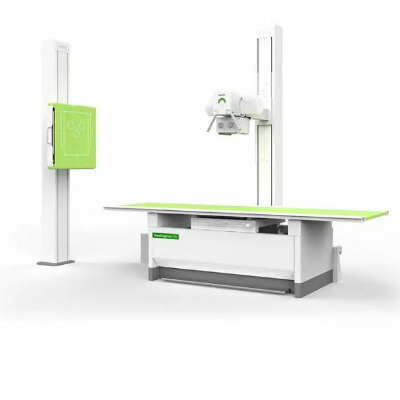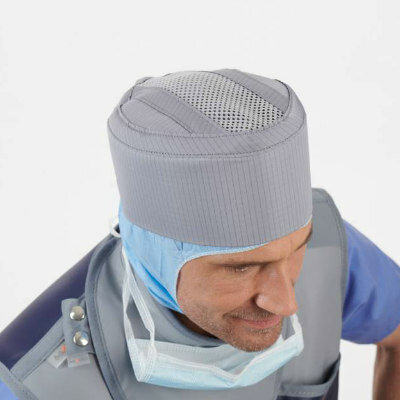Next Generation MR-Guided Focused Ultrasound Ushers In Future of Incisionless Neurosurgery
|
By MedImaging International staff writers Posted on 18 Apr 2024 |

Essential tremor, often called familial, idiopathic, or benign tremor, leads to uncontrollable shaking that significantly affects a person’s life. When traditional medications do not alleviate symptoms, surgery may become necessary. An alternative treatment option is focused ultrasound, which controls tremors without the need for surgical incisions and typically involves fewer complications. This procedure involves the use of MRI to accurately direct sound waves to a precise location in the brain believed to cause the tremors. Initially, low energy is used to ensure the patient can communicate any sensations or side effects they experience, allowing the physician to make personalized adjustments. Subsequently, the energy is gradually increased to create a small therapeutic lesion, resulting in many patients seeing immediate tremor improvement in the treated hand.
Insightec (Haifa, Israel;) has now launched Exablate Prime, the next generation of its MR-guided focused ultrasound, with improved functionality and safety features to facilitate incisionless neurosurgery. This system, a significant enhancement to the company’s Exablate Neuro platform, builds on more than a decade of research and development for enhancing the precision, efficiency, and overall experience for both the surgeon and patient. Similar to its predecessor, the Exablate Prime facilitates incisionless neurosurgery that can be performed as an outpatient procedure, offering relief for conditions like essential tremor and Parkinson’s disease. Notable improvements to the new Exablate Prime include an enriched user interface and enhancements to optimize productivity.
The new Exablate Prime comes with guided workflows, automated steps, and a streamlined UI. It features intelligent algorithms for one-click skull-density-ratio (SDR) calculations, automatic fusion and AC/PC identification, and efficient no-pass region detection. It enables intuitive and informative therapy delivery with temperature-driven control enabled by an accurate temperature prediction algorithm. Exablate Prime offers precise targeting and lesion shaping with sub-millimetric targeting control and advanced shaping masks. Other enhancements include improved cyber security, PACS connectivity, remote planning, and troubleshooting, automatic MR scan acquisition, intelligent targeting tools, and larger MR data sets in one planning session. The system also boasts an optional, upgraded 3T head coil for improved imaging and 3D thermal spot visualization. Insightec has obtained CE approval for Exablate Prime.
"Our unwavering commitment to enhancing patient care through innovative technology led us to develop Exablate Prime," said Maurice R. Ferre, M.D., CEO and chairman of the board of Insightec. "Although Exablate Neuro has revolutionized the field of neurosurgery, Exablate Prime takes it to entirely new levels, pushing the boundaries of what is possible. We couldn't be more proud of the end result – Exablate Prime is the future of incisionless neurosurgery."
"With the growing number of European countries supporting focused ultrasound as viable treatment option for essential tremor, Exablate Prime is truly exciting," commented Giuseppe Carbone, vice president of Insightec Europe. "We are confident it will make even more of a positive impact to empower Europeans living with essential tremor and Parkinson's disease – as well as their physicians."
Latest MRI News
- PET/MRI Improves Diagnostic Accuracy for Prostate Cancer Patients
- Two-Part MRI Scan Detects Prostate Cancer More Quickly without Compromising Diagnostic Quality
- World’s Most Powerful MRI Machine Images Living Brain with Unrivaled Clarity
- New Whole-Body Imaging Technology Makes It Possible to View Inflammation on MRI Scan
- Combining Prostate MRI with Blood Test Can Avoid Unnecessary Prostate Biopsies
- New Treatment Combines MRI and Ultrasound to Control Prostate Cancer without Serious Side Effects
- MRI Improves Diagnosis and Treatment of Prostate Cancer
- Combined PET-MRI Scan Improves Treatment for Early Breast Cancer Patients
- 4D MRI Could Improve Clinical Assessment of Heart Blood Flow Abnormalities
- MRI-Guided Focused Ultrasound Therapy Shows Promise in Treating Prostate Cancer
- AI-Based MRI Tool Outperforms Current Brain Tumor Diagnosis Methods
- DW-MRI Lights up Small Ovarian Lesions like Light Bulbs
- Abbreviated Breast MRI Effective for High-Risk Screening without Compromising Diagnostic Accuracy
- New MRI Method Detects Alzheimer’s Earlier in People without Clinical Signs
- MRI Monitoring Reduces Mortality in Women at High Risk of BRCA1 Breast Cancer
- Breakthrough AI-Based Quantitative Brain Imaging in MR to Advance Neurology Care
Channels
Radiography
view channel
Novel Breast Imaging System Proves As Effective As Mammography
Breast cancer remains the most frequently diagnosed cancer among women. It is projected that one in eight women will be diagnosed with breast cancer during her lifetime, and one in 42 women who turn 50... Read more
AI Assistance Improves Breast-Cancer Screening by Reducing False Positives
Radiologists typically detect one case of cancer for every 200 mammograms reviewed. However, these evaluations often result in false positives, leading to unnecessary patient recalls for additional testing,... Read moreUltrasound
view channel
Deep Learning Advances Super-Resolution Ultrasound Imaging
Ultrasound localization microscopy (ULM) is an advanced imaging technique that offers high-resolution visualization of microvascular structures. It employs microbubbles, FDA-approved contrast agents, injected... Read more
Novel Ultrasound-Launched Targeted Nanoparticle Eliminates Biofilm and Bacterial Infection
Biofilms, formed by bacteria aggregating into dense communities for protection against harsh environmental conditions, are a significant contributor to various infectious diseases. Biofilms frequently... Read moreNuclear Medicine
view channel
New SPECT/CT Technique Could Change Imaging Practices and Increase Patient Access
The development of lead-212 (212Pb)-PSMA–based targeted alpha therapy (TAT) is garnering significant interest in treating patients with metastatic castration-resistant prostate cancer. The imaging of 212Pb,... Read moreNew Radiotheranostic System Detects and Treats Ovarian Cancer Noninvasively
Ovarian cancer is the most lethal gynecological cancer, with less than a 30% five-year survival rate for those diagnosed in late stages. Despite surgery and platinum-based chemotherapy being the standard... Read more
AI System Automatically and Reliably Detects Cardiac Amyloidosis Using Scintigraphy Imaging
Cardiac amyloidosis, a condition characterized by the buildup of abnormal protein deposits (amyloids) in the heart muscle, severely affects heart function and can lead to heart failure or death without... Read moreGeneral/Advanced Imaging
view channel
New AI Method Captures Uncertainty in Medical Images
In the field of biomedicine, segmentation is the process of annotating pixels from an important structure in medical images, such as organs or cells. Artificial Intelligence (AI) models are utilized to... Read more.jpg)
CT Coronary Angiography Reduces Need for Invasive Tests to Diagnose Coronary Artery Disease
Coronary artery disease (CAD), one of the leading causes of death worldwide, involves the narrowing of coronary arteries due to atherosclerosis, resulting in insufficient blood flow to the heart muscle.... Read more
Novel Blood Test Could Reduce Need for PET Imaging of Patients with Alzheimer’s
Alzheimer's disease (AD), a condition marked by cognitive decline and the presence of beta-amyloid (Aβ) plaques and neurofibrillary tangles in the brain, poses diagnostic challenges. Amyloid positron emission... Read more.jpg)
CT-Based Deep Learning Algorithm Accurately Differentiates Benign From Malignant Vertebral Fractures
The rise in the aging population is expected to result in a corresponding increase in the prevalence of vertebral fractures which can cause back pain or neurologic compromise, leading to impaired function... Read moreImaging IT
view channel
New Google Cloud Medical Imaging Suite Makes Imaging Healthcare Data More Accessible
Medical imaging is a critical tool used to diagnose patients, and there are billions of medical images scanned globally each year. Imaging data accounts for about 90% of all healthcare data1 and, until... Read more
Global AI in Medical Diagnostics Market to Be Driven by Demand for Image Recognition in Radiology
The global artificial intelligence (AI) in medical diagnostics market is expanding with early disease detection being one of its key applications and image recognition becoming a compelling consumer proposition... Read moreIndustry News
view channel
Bayer and Google Partner on New AI Product for Radiologists
Medical imaging data comprises around 90% of all healthcare data, and it is a highly complex and rich clinical data modality and serves as a vital tool for diagnosing patients. Each year, billions of medical... Read more




















